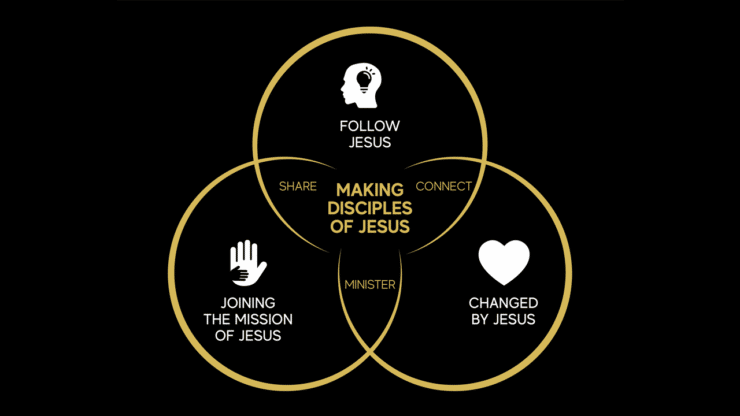The biblical model is that we disciple lost people to salvation by loving them and leading them into the truth that is in Jesus. Then, we continue to disciple the saved into the image of Jesus by loving them and leading them to be transformed as they learn to keep all that Jesus taught and commanded. As Paul wrote:
“…you heard about Christ and were taught in him in accordance with the truth that is in Jesus. You were taught, with regard to your former way of life, to put off your old self, which is being corrupted by its deceitful desires; to be made new in the attitude of your minds; and to put on the new self, created to be like God in true righteousness and holiness.” (Ephesians 4:21-24, NIV)
Our fundamental motivation, as disciples, is to make other disciples because we love God and love people.
If we love people, then we want what is best for them. When we make true disciples, they become better people. They become better singles or spouses. They become better family members. They become better workers and community members. They become better citizens of communities, cities, states, and countries. To help people know Christ and learn to be transformed into the image and likeness of Christ is the best thing in the world. It is the most loving thing we can do.
Imagine for a moment that a significant portion of the population began to treat every other person the way that Jesus would treat them. What does that look like? That is the beautiful mission that God has entrusted to his disciples and his church.
Disciple Making as the Core Mission of the Church
Given that the end goal of the church and church leadership is that we would disciple as many as possible to salvation and then that every saved person in our church is conformed into the image of Jesus (Ephesians 4:11-16; 4:21-24; Colossians 1:26-28), then it follows that the core mission of the church should be disciple making (see the short book that Scott Sager and I wrote on this topic: Disciple Making: The Core Mission of the Church).
In both Ephesians 4:11-16 and Romans 12:3-8, Paul wrote that each believer is a member of the greater body of Christ, the church. He wrote that each believer has different gifts and a unique purpose within the church to fulfill. However, whatever those gifts and purposes are, they should lend themselves to the core mission of holistic, love-driven disciple making.
In Romans 12, Paul lists gifts such as prophesying, serving, teaching, encouraging, giving, leading, and showing mercy. Clearly, this is not an exhaustive list, but it gives a good idea of how any believer can contribute to the disciple making efforts of their church, even if they are not adept at personally making disciples. Any faithful disciple can contribute their time, talent, and treasure to helping their church and others make disciples of Jesus.
What about Disciples Who Do Not Personally Make Disciples?
In every church and ministry there will be disciples who do not personally make disciples. Some have good reasons. Here are six examples where it might be especially difficult:
-
a new Christian (infant in the faith) who does not yet know how to make disciples
-
a health condition (e.g., stuck in bed) which prevents a person from physically meeting with others
-
a work situation (living in a Muslim country) which makes it dangerous to personally make disciples
-
a marriage situation (e.g., hostile spouse) which makes it difficult to disciple people in the family
-
a family situation (e.g., caring every day for an elderly parent) which makes it difficult to personally make disciples
-
a mental health situation which prevents a person from being able to personally make disciples
These exceptions can be important. If the issue is simply spiritual immaturity, then time and spiritual growth within a church that champions Jesus-style disciple making should help any believer to become a disciple maker. They will need teaching, coaching, and equipping to get there. Many will need the leadership of the church to give them an easy-to-follow model and a lot of encouragement, but in that environment, a surprising number of people will personally join the mission. I (Bobby) know this to be true from experience.
However, we must acknowledge that there will always be some who find it very difficult to personally make disciples. Even for these believers, they can help make disciples in a disciple making church when they support the church financially, when they serve in a ministry of the church (e.g., from child-care to greeting), and when they participate in groups within the church. There are clearly things that every person in a church can do to help the church’s mission of disciple making.
And there is one more crucial thing that everyone should be called to do: pray. Notice what Paul wrote to the Colossian Christians regarding how they could support his disciple making mission of reaching lost people and establishing churches:
“Devote yourselves to prayer, being watchful and thankful. And pray for us, too, that God may open a door for our message, so that we may proclaim the mystery of Christ, for which I am in chains. Pray that I may proclaim it clearly, as I should.” (Colossians 4:2-4)
At a minimum, any believer can pray for their church’s disciple making efforts, those leading the church making disciples, and those being made into disciples of Jesus.
We encourage everyone to do everything they can do to make disciples personally and to help the church make disciples corporately in our churches—and literally everyone can join in to the important ministry of intercessory prayer. We believe that God wants everyone to be a disciple and help make disciples, to the best of their ability.
As churches, let’s encourage and empower everyone to do his or her part.
For King Jesus,
Bobby Harrington and Curtis Erskine
Discipleship.org













